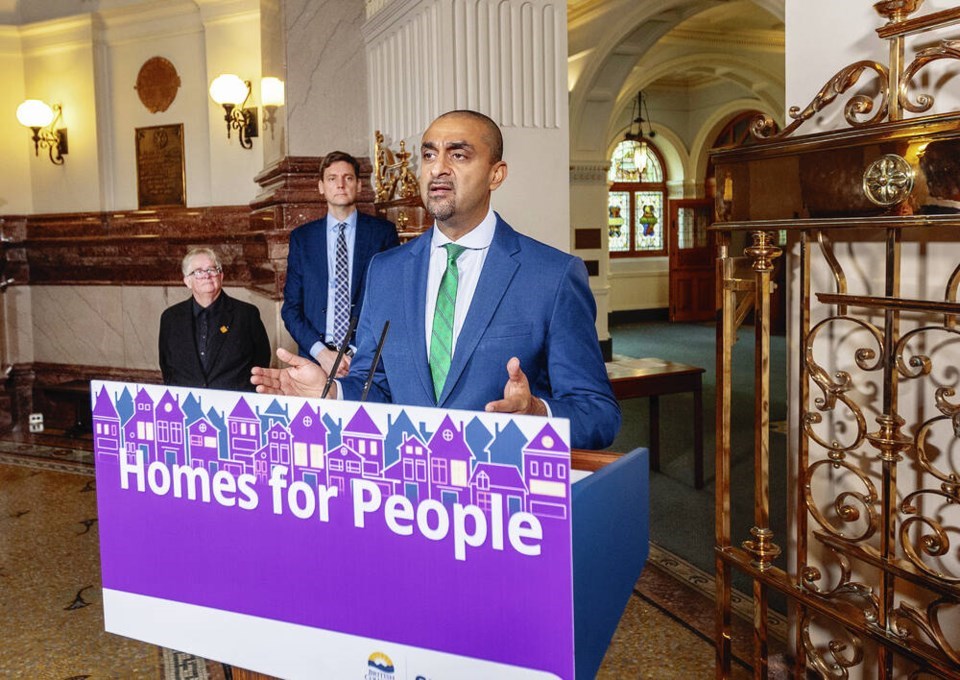B.C.’s housing minister responded to more than a year of complaints by supportive housing providers this week by announcing a “review” of their concerns, the latest in a series of slow-moving, navel-gazing exercises by the New Democratic government.
Ravi Kahlon said a new “working group” of police, supportive housing providers, BC Housing and others will tackle the issue of weapons, violence and unchecked drug use by tenants unfit to stay in supportive housing but who can’t be easily evicted by the providers under the Residential Tenancy Act.
“We’re tasking this working group to come back to us with solutions,” said Kahlon.
The players involved have been proposing “solutions” for almost two years to a largely unreceptive government.
They started in January 2024 when government changed the rules to give supportive housing tenants more protection under the Residential Tenancy Act, making it harder for providers to evict people who are disruptive to staff and other residents.
The move left major players like Pacifica Housing and Portland Hotel Society “reeling,” PHS CEO Micheal Vonn told The Globe and Mail at the time.
“We’re not providing housing in any ordinary sense,” said Vonn. “This isn’t about a neighbour yelling at a neighbour. It’s threatening behaviour and we don’t have eight months to go through a process.”
The government’s reply? Tough.
The providers tried again this past May, holding a joint press conference to plead for the province to institute a weapons ban inside their facilities, and remove their purpose-built units from the Residential Tenancy Act so they can address violent tenants quickly and ensure the safety of staff.
Kahlon’s reply: No.
“I believe people are safe,” the minister said at the time, arguing that the facilities are often all that stands between some people and homelessness. “And I believe they are much safer than if they were in encampments, or sleeping in parks. It’s safer not only for the public, it’s safer for those individuals.”
Victoria’s police chief backed up the supportive housing providers, saying they need to be able to remove criminals that bring in weapons and drugs, and who exploit other tenants.
The government refused to listen for two months, as pressure increased. Then it did the least it could do: Call all the groups who’ve already proposed solutions back together into a working group and ask them to do it all over again.
It is a pattern for the current administration. You’d need two hands and both feet to count the number of reviews, advisory groups, task forces, working groups and other bureaucratic balderdash this government currently has piled up in various ministries.
Here, in no particular order, is a partial list: The premier’s task force on tariffs, the task force on food security, the review into public safety at outdoor events, the ease-of-doing-business review, the Community Living BC review, the Provincial Health Services Authority internal review, the review for efficiencies in all health authorities, the mining timeline review, the review into putting tracers into safe supply, the internal government cost savings review, the BC Timber Sales review, the Provincial Forest Advisory Council review, the wood fibre source review, and more.
That’s not even touching the rolling reviews into repeat offenders, involuntary care, homelessness and the toxic drug crisis.
Most of the reviews look at fixing mistakes the BC NDP made earlier in its tenure, having been in power now for eight years. In some cases, the government has gone back to the very beginning, hiring the creators of Community Living BC and the Provincial Health Services Authority to re-examine their agencies decades later, under lucrative consulting contracts paid for by taxpayers.
Reviews have their place. They are most often used by new governments to take stock of the landscape they inherit and chart a new path. Sometimes they are deployed on complex files to try and gather a type of consensus for a response.
But quite often they are just used by governments to stall for time on files where the solutions are already known but are, for whatever reason, unpalatable to the politicians in charge.
That’s the most dangerous situation, and where this government seems to be stuck. Because then it’s not really about the review at all. It’s about stubbornly refusing to listen, and scrambling to slow play a response.
Rob Shaw has spent more than 17 years covering B.C. politics, now reporting for CHEK ÃÛÌÒÊÓƵapp and writing for The Orca/BIV. He is the co-author of the national bestselling book A Matter of Confidence, host of the weekly podcast Political Capital, and a regular guest on CBC Radio.
[email protected]
🚨New newsletter alert! Stay ahead of the curve in B.C. politics. Get expert political analysis delivered straight to your inbox, plus inside scoops and other stories from across the province.




